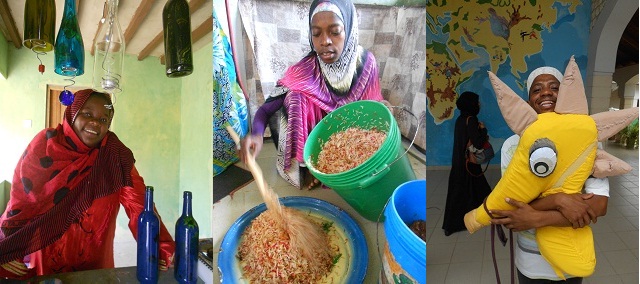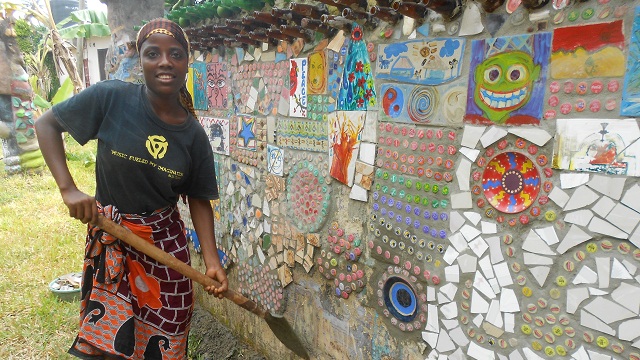SUMMARY
This is AI generated summarization, which may have errors. For context, always refer to the full article.
 ZANZIBAR, Africa – After living in the US for a semester, coming to Zanzibar was like coming home. At first glance, Zanzibar could pass as an island of the Philippines.
ZANZIBAR, Africa – After living in the US for a semester, coming to Zanzibar was like coming home. At first glance, Zanzibar could pass as an island of the Philippines.
It has dala-dalas, battered Toyota Hiace minivans that serve as the main mode of public transportation. It has a central market that sells produce, meat, hard plastic ware, pirated 32-in-1 DVDs, and everything in between.
Villages have dukas (sari-sari stores) and neighborhood bread men who yell“mikate” (Swahili for bread), much like how balut vendors have their distinct annunciation. The weather is almost the same. However, there are few things more oppressive than the noontime Zanzibari sun.
Despite the similarities, nothing could have fully prepared me for working in Africa. As a requirement for grad school, I’m doing volunteer work with an NGO in Mangapwani Village. Half of my work involves conducting teacher training and overseeing environmental clubs in nearby schools.
I was told there are two speeds on the island—pole-pole (slowly) and stop. Any progress, no matter how pole-pole is progress enough. Push too hard and things come to a stop.
Keeping those words of wisdom in mind, I did my initial observation of a Grade 3 class. I had my work cut out. The students did everything entirely through rote memory. For 45 minutes, they recited the same 5 sentences about hygiene over and over again. The teacher ended class by singing “I am wash my hands.”
Rote
It’s not uncommon for students to graduate high school being able to recite paragraphs in English without knowing what they mean. Classes taught in Swahili also rely on memorization, and corporal punishment is practiced.
Some teachers in Zanzibar attend seminars for the sitting fee. But since seminars are in English, they are of little use. The headmistress of Mangapwani School told me, “We cannot teach well because we don’t have funds.”
I’ve always had high respect for Filipino teachers, but even more so now. All I could think of were students in rural Philippines who walk kilometers to get to a school with no desks, and their teachers who find ways to make do with resources they have.
But teachers in Zanzibar cannot be blamed. They teach how they were taught. The Tanzanian government dictates the syllabi and makes the exams. Since test results are used to gauge how well a school is doing and sometimes how much funding a school gets, there is a lot of pressure on teachers.
Teacher training has been challenging, but learning Swahili helped. The teachers still giggle at my pronunciation, but they are putting much more effort into learning, after seeing the effort I put into my Swahili. Pole-pole, slowly but surely.
Home and the other half of work are in Creative Solutions, a grassroots NGO which serves as a preschool, a school for English and Computer, a livelihood center, and a place where art is created and shared. Their philosophy is, “Each one, teach one.” Everything we learn, we must share.

I handle the English night class. Last week we went stargazing before they had to write a descriptive paragraph of the night sky. All the talk on heavenly bodies eventually led to a realization by one of the students that we live on the planet and not in it. It took a while before he accepted that beneath the Earth’s crust is dense rock and not human beings.
Questions like “Why don’t we fall off the planet?” and “Why is the ocean blue?” came up. Great questions but not the easiest to answer given their foundation in Science. Moments like these make me want to pull my hair in frustration over the Tanzanian educational system. At the same time moments like these, when hungry minds long to be fed, serve as a reminder of how much I love teaching.
Beyond the classroom
Some days students start a puppet theater and have acting gigs around the island. The main character is played by Maggie, a 24-year-old girl who came to Creative Solutions two years ago, not being able to read Swahili and not knowing a word of English. Now she is proficient in both languages and helps write scripts and songs for their plays. According to Maggie, “If you really want to learn, you can teach yourself anything.”

Despite having been here for over a month, there are still many things that confuse me about Zanzibari culture. It seems the more I explore the island, the more I notice such striking contrasts.
I will probably never understand how a man and a woman cannot be seen holding hands in public, but no one has a problem grabbing onto a shoulder or a thigh or any other part of someone else’s body while finding a seat on the dala-dala. They also don’t mind sitting on each other’s laps for the duration of the ride.
I have a hard time wrapping my mind around how lessons on biology and natural resources can be taught using only textbooks when ocean and wildlife are practically right outside the classroom.
It still baffles me how students go through their entire school life memorizing but not necessarily learning. Meanwhile, just down the road, students are outwitting the system by learning, making art, and picking up life skills in preparation for a world much bigger than their village.
Some of the Creative Solution graduates have become hotel employees, government workers, rangers, and teachers themselves.
In Zanzibar, in the Philippines, and in schools around the developing world, there are students who find ways to exceed expectations and hungry minds waiting to be fed. There are teachers who find ways to outsmart the system. Sometimes all it needs is a little push.
Other times it is a slow process that takes a lot of patience. Pole-pole. I learned it is much better than stop. – Rappler.com
Majalya Fernando is currently pursuing her Masters in Sustainable Development at SIT Graduate Institute in Washington, DC. Although she is enjoying Africa and DC, she can’t wait to go back to the Philippines.
Add a comment
How does this make you feel?
There are no comments yet. Add your comment to start the conversation.